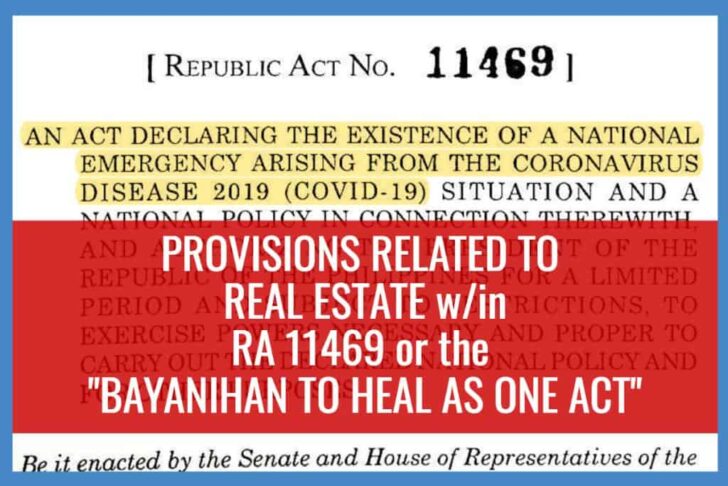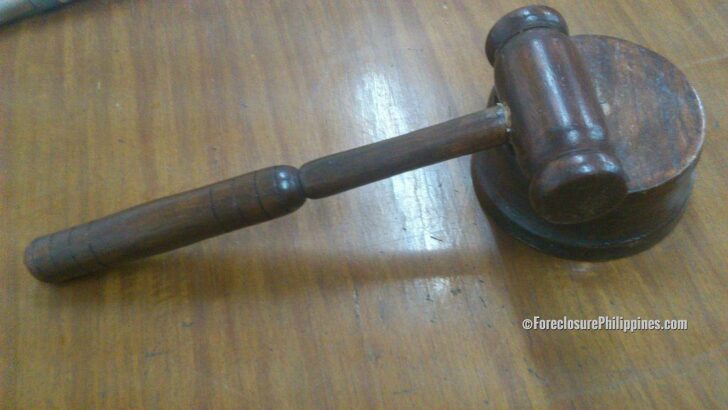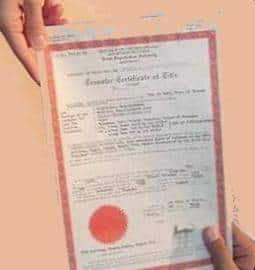I attended a seminar on how to prevent foreclosures more than a year ago and I often heard the speaker talk about Act No. 3135 which is An Act to Regulate the Sale of Property under Special Powers Inserted in or Annexed to Real Estate Mortgages. I have found the full text of the law so I’ll share it here.
I can’t remember exactly who gave the seminar because my notes and handouts were also destroyed during typhoon Ondoy’s visit, maybe if and when I find notes in my only laptop that got saved, I can share more details on that seminar about foreclosure prevention.
That was the first and only seminar I have attended that thoroughly discussed Act 3135 which is often referenced by court rulings pertaining to foreclosures in the Philippines.
As far as I understand, Act No. 3135 governs extrajudicial foreclosures in the Philippines. Sorry, I really can’t so I will not attempt to discuss the salient features of Act 3135, I will just share its full text here for easy reference for everyone, took me quite some time to find this! Here you go…
ACT NO. 3135 – AN ACT TO REGULATE THE SALE OF PROPERTY UNDER SPECIAL POWERS INSERTED IN OR ANNEXED TO REAL-ESTATE MORTGAGES
SECTION 1. When a sale is made under a special power inserted in or attached to any real-estate mortgage hereafter made as security for the payment of money or the fulfillment of any other obligation, the provisions of the following election shall govern as to the manner in which the sale and redemption shall be effected, whether or not provision for the same is made in the power.
SECTION 2. Said sale cannot be made legally outside of the province in which the property sold is situated; and in case the place within said province in which the sale is to be made is subject to stipulation, such sale shall be made in said place or in the municipal building of the municipality in which the property or part thereof is situated.
SECTION 3. Notice shall be given by posting notices of the sale for not less than twenty days in at least three public places of the municipality or city where the property is situated, and if such property is worth more than four hundred pesos, such notice shall also be published once a week for at least three consecutive weeks in a newspaper of general circulation in the municipality or city.
SECTION 4. The sale shall be made at public auction, between the hours or nine in the morning and four in the afternoon; and shall be under the direction of the sheriff of the province, the justice or auxiliary justice of the peace of the municipality in which such sale has to be made, or a notary public of said municipality, who shall be entitled to collect a fee of five pesos each day of actual work performed, in addition to his expenses.
SECTION 5. At any sale, the creditor, trustee, or other persons authorized to act for the creditor, may participate in the bidding and purchase under the same conditions as any other bidder, unless the contrary has been expressly provided in the mortgage or trust deed under which the sale is made.
SECTION 6. In all cases in which an extrajudicial sale is made under the special power hereinbefore referred to, the debtor, his successors in interest or any judicial creditor or judgment creditor of said debtor, or any person having a lien on the property subsequent to the mortgage or deed of trust under which the property is sold, may redeem the same at any time within the term of one year from and after the date of the sale; and such redemption shall be governed by the provisions of sections four hundred and sixty-four to four hundred and sixty-six, inclusive, of the Code of Civil Procedure, in so far as these are not inconsistent with the provisions of this Act.
SECTION 7. In any sale made under the provisions of this Act, the purchaser may petition the Court of First Instance of the province or place where the property or any part thereof is situated, to give him possession thereof during the redemption period, furnishing bond in an amount equivalent to the use of the property for a period of twelve months, to indemnify the debtor in case it be shown that the sale was made without violating the mortgage or without complying with the requirements of this Act. Such petition shall be made under oath and filed in form of an ex parte motion in the registration or cadastral proceedings if the property is registered, or in special proceedings in the case of property registered under the Mortgage Law or under section one hundred and ninety-four of the Administrative Code, or of any other real property encumbered with a mortgage duly registered in the office of any register of deeds in accordance with any existing law, and in each case the clerk of the court shall, upon the filing of such petition, collect the fees specified in paragraph eleven of section one hundred and fourteen of Act Numbered Four hundred and ninety-six, as amended by Act Numbered Twenty-eight hundred and sixty-six, and the court shall, upon approval of the bond, order that a writ of possession issue, addressed to the sheriff of the province in which the property is situated, who shall execute said order immediately.
SECTION 8. The debtor may, in the proceedings in which possession was requested, but not later than thirty days after the purchaser was given possession, petition that the sale be set aside and the writ of possession cancelled, specifying the damages suffered by him, because the mortgage was not violated or the sale was not made in accordance with the provisions hereof, and the court shall take cognizance of this petition in accordance with the summary procedure provided for in section one hundred and twelve of Act Numbered Four hundred and ninety-six; and if it finds the complaint of the debtor justified, it shall dispose in his favor of all or part of the bond furnished by the person who obtained possession. Either of the parties may appeal from the order of the judge in accordance with section fourteen of Act Numbered Four hundred and ninety-six; but the order of possession shall continue in effect during the pendency of the appeal.
SECTION 9. When the property is redeemed after the purchaser has been given possession, the redeemer shall be entitled to deduct from the price of redemption any rentals that said purchaser may have collected in case the property or any part thereof was rented; if the purchaser occupied the property as his own dwelling, it being town property, or used it gainfully, it being rural property, the redeemer may deduct from the price the interest of one per centum per month provided for in section four hundred and sixty-five of the Code of Civil Procedure.
SECTION 10. This Act shall take effect on its approval.
Approved: March 6, 1924
Source: http://www.chanrobles.com/acts/actsno3135.html
By the way, there is an amendment to Act No. 3135 and it is Act No. 4118. I’ll also share the full text of this act here in one of my next posts. Feel free to to leave a comment below if you want to share any insights, I would be very thankful and would appreciate it very much!
—
On a different note, if you have read one of my tweets or status update in facebook, you probably already know how heavy my workload has been this month of December. In addition, my wife and I are still very busy looking for a sound investment we can call our new home. If I have been unable to answer a comment here or any of your e-mail or text messages, please accept my apologies. I humbly ask for more patience and let me reassure you all that things will improve soon.
—
My vision – financial freedom for all!
Jay Castillo
Real Estate Investor
Real Estate Broker License #: 20056
Blog: https://www.foreclosurephilippines.com
Click here to contact me via E-mail
Mobile phone (Call/SMS): +639178843882
Follow me in twitter: http://twitter.com/jay_castillo
Become a Fan in Facebook: Foreclosure Philippines fan page
Text by Jay Castillo. Copyright © 2009 All rights reserved.
PS. If you are a new visitor, please start here to learn more about foreclosure investing in the Philippines.
PPS. If you feel that anyone else you know might benefit from this post, please do share this to them and don’t forget to subscribe to e-mail alerts and get notified of new listings of bank foreclosed properties, public auction schedules, and real estate investing tips. If your inbox is getting full, you may subscribe through my RSS Feed instead.




![R. A. 9510 [Credit Information System Act (CISA)] 2 Credit Report](https://www.foreclosurephilippines.com/wp-content/uploads/2015/07/Credit-Report-2-432x378.jpg)




Sir/ Madam,
Nais ko pong sana malaman kong ano po ba ang tamang batas kapag ang property ay ma foreclose. Like my situation now yung house and lot ko po ay di ko na mababayaran ang montly amortization bale stop ko na po at back out na ako. Ang down payment ko po dito ay 130k at binayaran ko ng 1 year. After that nakahulog po ako ng more ng than 2 years. Now nag-aaply na po kami ng extension to stay. At wala pang na serve sa akin na foreclosure order from developer. Meron pa po ba ako ma refund na pera kong sakali? Gusto ko lang malaman ang tamang batas sa proseso nito.
Thank you and best regards.
Sir/Madam,
May tanong po ako tungkol sa extra judicial petition for sale, sakop po ba ito ang debtor or ang mortgagor-respondent eh matagal ng patay, at ang mortgagee or debtee or ang nagpautang eh, nagfile ng extra judicila petition recently gayon patay na ang debtor or ang may utang…. san po papasok ang case na ito ano po mangyayari sa property. tama po ba ang ginagawa ng may pautang na ito na magfile ang extra judiacial sale.
TIA
hello tia! sa tingin ko, estate na ng deceased debtor/mortgagor ang sasagot sa utang, kaya pwede ang extrajudicial foreclosure.
Hello all, meron na bang naka-attend sa inyo ng public sale of properties foreclosed by NHMFC? Open ba? As in malalaman mo yong bids ng other parties? Thanks a lot.
Another thing, totoo ba yong naririnig ko na any family member of the debtor, such as wife, child, parent and sibling can participate in the sale of the foreclosed property? Thanks again.
Is it lawful for banks like BPI not to accept bank guarantee from another bank or institution (like Pag-ibig)? The situation is this, a property is mortgaged in this bank redeemable within the redemption period. Someone applied for a housing loan from Pag-ibig to save the said property but the bank would not accept the letter of guarantee sent to them. They want the loan proceeds first before they would allow the title to be trasnferred to the person redeeming the property. Is this right? Then what are bank guarantees for?
ACT NO. 4118
ACT NO. 4118 – AN ACT TO AMEND ACT NUMBERED THIRTY-ONE HUNDRED AND THIRTY-FIVE, ENTITLED “AN ACT TO REGULATE THE SALE OF PROPERTY UNDER SPECIAL POWERS INSERTED IN OR ANNEXED TO REAL-ESTATE MORTGAGES.”
Section 1. Section six of Act Numbered Thirty-one hundred and thirty-five, entitled “An Act to regulate the sale of property under special powers inserted in or annexed to real-estate mortgages,” is hereby amended to read as follows:
“Section 6. In all cases in which an extrajudicial sale is made under the special power hereinbefore referred to, the debtor, his successors in interest or any judicial creditor or judgment creditor of said debtor, or any person having a lien on the property subsequent to the mortgage or deed of trust under which the property is sold, may redeem the same at any time within the term of one year from and after the date of the sale; and such redemption shall be governed by the provisions of sections four hundred and sixty-four to four hundred and sixty-six, inclusive, of the Code of Civil Procedure, in so far as these are not inconsistent with the provisions of this Act.”
Sec. 2. The following three sections are hereby inserted after section six of said Act Numbered Thirty-one hundred and thirty-five:
“Section 7. In any sale made under the provisions of this Act, the purchaser may petition the Court of First Instance of the province or place where the property or any part thereof is situated, to give him possession thereof during the redemption period, furnishing bond in an amount equivalent to the use of the property for a period of twelve months, to indemnify the debtor in case it be shown that the sale was made without violating the mortgage or without complying with the requirements of this Act. Such petition shall be made under oath and filed in form of an ex parte motion in the registration or cadastral proceedings if the property is registered, or in special proceedings in the case of property registered under the Mortgage Law or under section one hundred and ninety-four of the Administrative Code, or of any other real property encumbered with a mortgage duly registered in the office of any register of deeds in accordance with any existing law, and in each case the clerk of the court shall, upon the filing of such petition, collect the fees specified in paragraph eleven of section one hundred and fourteen of Act Numbered Four hundred and ninety-six, as amended by Act Numbered Twenty-eight hundred and sixty-six, and the court shall, upon approval of the bond, order that a writ of possession issue, addressed to the sheriff of the province in which the property is situated, who shall execute said order immediately.
“Section 8. The debtor may, in the proceedings in which possession was requested, but not later than thirty days after the purchaser was given possession, petition that the sale be set aside and the writ of possession cancelled, specifying the damages suffered by him, because the mortgage was not violated or the sale was not made in accordance with the provisions hereof, and the court shall take cognizance of this petition in accordance with the summary procedure provided for in section one hundred and twelve of Act Numbered Four hundred and ninety-six; and if it finds the complaint of the debtor justified, it shall dispose in his favor of all or part of the bond furnished by the person who obtained possession. Either of the parties may appeal from the order of the judge in accordance with section fourteen of Act Numbered Four hundred and ninety-six; but the order of possession shall continue in effect during the pendency of the appeal.
“Section 9. When the property is redeemed after the purchaser has been given possession, the redeemer shall be entitled to deduct from the price of redemption any rentals that said purchaser may have collected in case the property or any part thereof was rented; if the purchaser occupied the property as his own dwelling, it being town property, or used it gainfully, it being rural property, the redeemer may deduct from the price the interest of one per centum per month provided for in section four hundred and sixty-five of the Code of Civil Procedure.”
Sec. 3. The number of the present section seven of said Act Numbered Thirty-one hundred and thirty-five is hereby changed, making it section ten.
Sec. 4. This Act shall take effect on its approval.
Approved: December 7, 1933
To any Person who have expertise or else have knowledge(special mention to lawyers): may I ask your opinion on this issue, The better remedy for the breach of contract of mutuum with real estate mortgage (ACT NO. 3135) is Ordinary action for sum of money. your urgent answer will greatly help us in defending this issue!!!!!
To any Honorable Chief Justice: I am student and a part of the learning activity in our Law subject is a debate about the better remedy for breach of contract of mutuum with real estate mortgage. Is it an ORDINARY ACTION FOR SUM OF MONEY or JUDICIAL FORECLOSURE OF THE REAL ESTATE MORTGAGE? Your reply is greatly appreciated!
They are exclusive of each other. If you avail foreclosure, you have to rely solely to the property to be foreclosed. If you filed a claim for sum of money, you can no longer foreclose.
You are asking for the “better” remedy between the two (action for collection of sum of money on the one hand and judicial foreclosure of real estate mortgage upon the other hand) when confronted with a situation of a breach of loan (“mutuum”) with real estate mortgage.
I would say that the better remedy in such a situation is the latter, that is, an action for judicial foreclosure of real estate mortgage upon the loan. This is because in this action, the procedure is not contracted and hence not expensive, unlike in an action for collection. Also, in judicial foreclosure, there is already the property to be sold on auction, the proceeds of which will apply to the indebtedness, while in an action for collection, there is no assurance for the satisfaction of judgement.
Pingback: The Star Group of Companies invites everyone to a foreclosure sale of prime properties!
Pingback: Act No. 4118 – An Act that amends Act No. 3135 which governs extrajudicial foreclosures
Pingback: Tweets that mention Act No. 3135 – An Act to Regulate the Sale of Property under Special Powers Inserted in or Annexed to Real Estate Mortgages (full text)